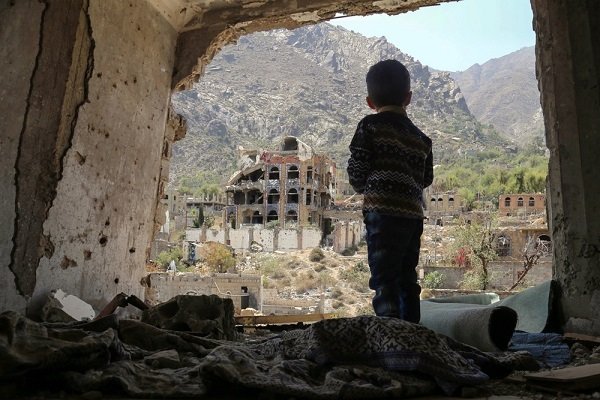However, less than 24 hours after the landmark truce was announced by UN chief Antonio Guterres, Saudi-led coalition jets again bombarded Hudeidah, making mockery of the ceasefire agreement.Saudi-led coalition has violated the ceasefire at least 59 times since Thursday, launching deadly airstrikes in the residential areas of Hudeidah.
Rune Agerhus is the chairman of International Solidarity Committee with Yemen (ISCY) and editor-in-chief of Uprising Today Media. His work is mainly focused on the Yemeni struggle against foreign aggression and he is also a noted commentator on MENA affairs.
In an interview with Tehran Times, Mr. Agerhus spoke about the ceasefire facilitated by the UN, how Saudi-led coalition violated the truce, humanitarian situation in the war-ravaged country and why the world needs to speak in one voice against the Saudi war crimes in Yemen.
Excerpts from the interview:
There was a ceasefire agreement between Yemen’s warring parties brokered by the UN in Sweden. But within 24 hours the ceasefire was broken. Can you tell us what exactly happened?
According to Yahya Sari'a, spokesman of Yemeni Armed Forces, the Saudi-led coalition launched more than 59 attacks in Hudeidah less than 48 hours from the UN-brokered de-escalation agreement in Sweden.
The Saudi-led coalition is targeting areas around Tuhayta, Al-Duraihimi and further northeast around the kilo-16 area into Hudeidah. The spokesman also recently stated that the Saudi-led coalition had launched over 200 airstrikes since the consultations began in Sweden, leading to dozens of civilian casualties.
The landmark ceasefire agreement was widely welcomed. What did the agreement stipulate to end the fighting and resolve the humanitarian crisis?
The consultations in Sweden resulted in four main agreements. The swap of prisoners between the warring sides, de-escalation, and ceasefire around the city of Taiz, de-escalation in all of Hudeidah governorate, and lastly the opening of Sana'a airport (with inspections in Aden being customary).
The Hudeidah agreement gives the UN access to oversee the flow of humanitarian aid coming into Hudeidah via its strategic port. The Hudeidah de-escalation agreement also stresses that all warring sides must pull back and let local authorities run the governorate, yet it still remains unclear who the "local authorities" are.
It is pretty clear that hawks in Riyadh were not in favor of any such ceasefire agreement, so they decided to welcome it in their own characteristic way — by bombing Hudeidah. But we haven't seen any condemnation from the UN or world powers. Why are Saudi Arabia and its allies allowed to get away with such horrendous war crimes?
The people of Yemen does not completely trust the UN, knowing well how the world body allowed war crimes to take place in places like Rwanda and Bosnia. Furthermore, having a Saudi national as chairman of UN's Human Rights Committee paints them as untrustworthy. There are condemnations, but rarely any action is taken to stop bombardments. Saudi regime is holding much of the world hostage, using its oil resources as an effective blackmail tool.
Yemeni army has said that they are in favor of ceasefire and peace deal but they are also prepared to counter any aggression from Saudi led coalition. Could you update us on the latest situation in Hudeidah and adjoining areas?
Reliable sources have told me that things are calmer than usual, but the sporadic explosion sounds can be heard in the distance. As far as I can gather, a total ceasefire has not been effectively implemented yet, as the Saudi Airforce continues to hover above the governorate and Hudeidah city.
The Yemeni Army does indeed want peace and an effective ceasefire, but it also affirms its readiness to combat aggression by the use of force, if necessary.
The US Senate last week passed a resolution to withdraw military support to the Saudi-led coalition in Yemen. Do you think it will have any impact on the ground?
I doubt the US Senate resolution will have any major impact on the ground, to be quite frank. But it's a strong signal in the face of the Saudi-led coalition that the Senate has grown tired of Saudi barbarism. I am personally delighted to finally witness a massive outcry from the United States on Yemen.
The humanitarian situation in Yemen has been termed ‘catastrophic’. According to ICRC, 22.2 million people in Yemen are in need of humanitarian assistance. What is being done to tackle it?
Many local NGOs are doing their best to gather and collect funds in order to alleviate the suffering of people. I trust local NGOs more, as they know their country and where the food needs to be distributed.
Furthermore, activists across the globe are putting in tireless efforts to spread awareness, hoping that more action can be taken to end this humanitarian crisis. What needs to be done immediately is for the Saudi regime to unconditionally lift blockade of the country, given the fact that the blockade is solely responsible for the humanitarian catastrophe in Yemen today.
You have recently established the International Solidarity Committee with Yemen (ISCY). What's the main objective behind it?
The ISCY is a non-profit, de-centralized project aimed at creating a sole, unifying identity for activists, politicians, and journalists in the West, who want to actively do something for Yemeni people and their right to self-determination.
The ISCY will engage in consistent organizing of vigils and protests, fundraisers and banner activism, as well as produce material which people can buy to support the project. Printable material such as banners, flyers will be distributed free to anyone to print and distribute themselves in their local areas. The more people we are, the bigger the impact.
What do you think is the possible way out of this simmering crisis? Do you see peace returning to Yemen anytime soon?
I hope Saudi-led aggression comes to an end soon, but my hopes aren't exactly ‘high’. Saudi regime and its allies in Washington and Tel Aviv need to realize that Yemen isn't Saudi Arabia's exploitable playground anymore. The Yemeni people have had enough of Saudi interference and meddling in their domestic affairs, and they want to rule their country the way they deem right. That's the main issue at stake.
Saudi Arabia is too stubborn and ignorant to give up Yemen. The Yemeni government in Sana'a has stated innumerable times that they do not want this war and that they would like to engage in deals with their neighbors. But they have to be on mutual terms, and not solely for the benefit of the other.
Interview by: Syed Zafar Mehdi
MNA/TT


























Your Comment